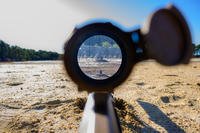
If you remember from our stories a couple months ago on the MQ-8B Fire Scout helo-drone, the Navy was in the middle of deciding what ship the UAV would be flown on as the service waits for the LCS to come into service. Since development of the Fire Scout has outpaced the troubled LCS, it made sense to put the drone to use now.
MQ-8B manufacturer Northrop Grumman has announced that the Navy decided to fly the drone aboard an FFG-7 Oliver Hazard Perry-class frigate and integrate it into the entire class while LCS progresses.
According to the current schedule, the Navy will conduct Technical Evaluation on the Fire Scout on FFG-7 in the fall 2008 and OpEval in the summer 2009. The Fire Scout will reach Initial Operating Capability soon after OpEval in 2009. The Navy will continue to support LCS Initial Operational Test and Evaluation (IOT&E) efforts in fiscal year 2011.
...a NorGrum release said...
Again, this marks a significant milestone for a program that was literally on life support a few years ago and proves that when you can get it right, things work out. We'll see how it works on the frigate, but clearly the move shows the Navy's got a lot of confidence in the platform.
Continues Northrop Grumman:
Fire Scout VTUAV restructuring is in the best interests of the Fleet and the U.S. Navy Fire Scout VTUAV program because it enables the Navy to continue supporting LCS integration and will provide a more mature system for LCS deployments.
Fire Scout is capable of landing on all aircapable ships, so integration efforts will focus on dynamic interface testing, supportability assessments and data management. The Navy and Northrop Grumman are working together to define and develop a roll-on/roll-off Fire Scout ship deployment package that will facilitate this effort.
Fire Scout is currently conducting envelope expansion, software validation, payload integration and data link testing at the Webster Field annex of Naval Station Patuxent River, Md.
-- Christian








